Brexit Brief Newsletter
4 November 2020

Welcome to the 4 November 2020 issue of the Brexit Brief
Welcome back to the Brexit Brief. This week’s edition covers the latest developments in the EU-UK negotiations, including 'the week that wasn't', European Council conclusions and Michel Barnier's statement to the European Parliament. We consider the state of play and preparedness 58 days ahead of the end of the transition period, as well as new legislation to implement the consent mechanism contained within the Protocol on Ireland/Northern Ireland.
The week that wasn’t
Following the 15 October European Council, the EU-UK talks on the future relationship were off, and then were back on again. A Number 10 spokesperson said the EU should “Only come to London next week if you [the EU] are prepared to discuss all issues, on the basis of legal texts, in an accelerated way, without the UK being required to make all the moves. If not there is no point in coming." Boris Johnson gave an address, saying the UK should prepare for ‘Australia-style’ trading arrangements. UK Chief Negotiator David Frost rescinded his invitation to his EU counterpart Michel Barnier, to talks in London.
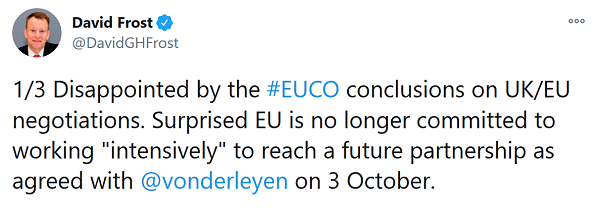
The cause for this rupture was apparently the language in the European Council conclusions which were published following the meeting of the 27 leaders. Wording about ‘intensifying’ negotiations, as per the draft conclusions, was removed as member states felt this word has been overused and had become meaningless.
Michel Barnier spoke to the European Parliament following the European Council and latest rounds of negotiations and meetings of the Joint Committee. He mentioned ‘sovereignty’ five times during his speech, and spoke of intensifying the talks. European Council President Charles Michel also addressed the European Parliament, using a somewhat more combative tone than Barnier. He said, “The UK wants access to our Single Market, while at the same time, being able to diverge from our standards and regulations, when it suits them.” He used the all too familiar trope regarding the UK’s position on Brexit – in French and in English: “On ne peut pas avoir le beurre, l'argent du beurre, et le sourire de la crémière. You can't have your cake and eat it.”
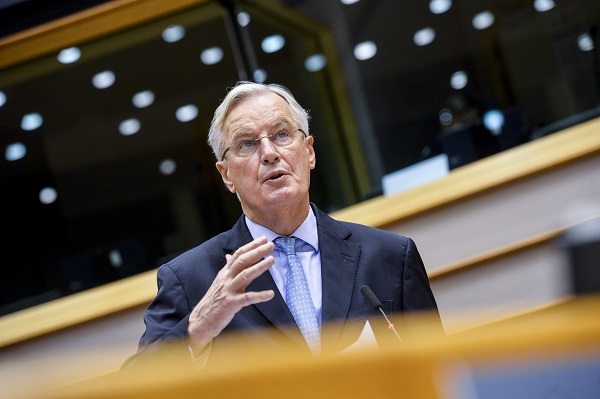
Copyright © European Union 2020 - Source : EP/ Benoit BOURGEOIS
The overtures in the European Parliament, tweets from the President of the European Commission Ursula von der Leyen, Michel Barnier, and phone calls between the parties - including wording on ‘intensification’ and acknowledgement of UK concerns - allowed talks to resume. A UK press statement on the resumption of negotiations welcomed Barnier’s acknowledgement that it was dealing with “an independent and sovereign country”. The two sides agreed a new set of organising principles for the negotiations. Talks will happen every day including weekends, unless both sides agree otherwise. The talks will be on the basis of legal texts, which can be seen as a ‘win’ for the UK: the EU had been reluctant to see this happen as it could open up the possibility that certain negotiating areas could be ‘closed off’ and won’t be able to be traded off against one another.
State of Play
Negotiations have resumed. While the idea of entering the ‘tunnel’ has been mooted for some time – intensive negotiations with no leaks or briefing to outsiders – the EU has wanted to see more openness to compromise from the UK side. However, the lack of information emerging from the ongoing talks may well suggest that we are heading towards the final stages of negotiations. Indeed, one commentator refers to a “media block-out tunnel” while describing the mood as cautiously optimistic.
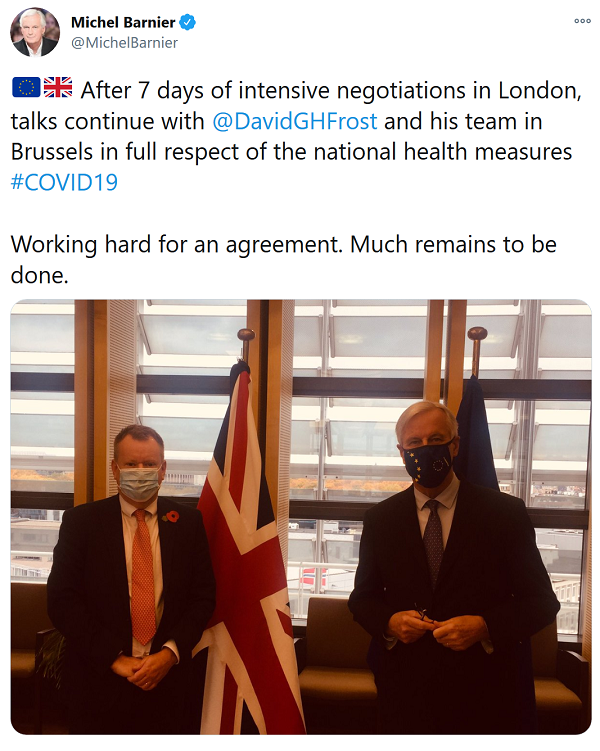
Clement Beaune, France’s Europe Minister, speaking to the Andrew Marr show on Sunday, described the matter of fisheries – one of the remaining sticking points between the sides - as “vitally important for France” and said he believed it was possible to find a solution which respects both sides’ interests. Some sources report that negotiations are moving closer to a solution on this issue whereby decisions about EU access to UK waters could be deferred to a later date. However, yesterday a spokesperson for the European Commission said, "We have not yet found a solution on fisheries."
58 days to go
The end of the transition period is fast approaching and deal or no-deal, this will entail significant changes for traders. The government has announced further plans to keep trade flowing smoothly beyond 31 December 2020. Legislation has been brought forward for the traffic management system in Kent: all HGVs will require a ‘Kent Access Permit’ if they are using the channel crossing. An information campaign with the slogan ‘Time is running out’ has been launched to help hauliers, businesses and traders.
The leaders of 40 food and drink associations have written to Boris Johnson warning that they may decide to stop operating in Northern Ireland, citing increased trading costs across the Irish Sea and pointing to several issues regarding GB-NI trade which have not yet been addressed, for example on labelling, and new requirements for animal and plant products. The groups said that “threatens to undermine the viability of the Northern Ireland market altogether for businesses operating in Great Britain” and has asked the UK Government to seek exemptions from the EU to reduce the burden imposed on companies by the upcoming changes.
In response to this article on the implications of the end of the transition period for both traders and consumers in Northern Ireland – potential lack of availability of products, higher costs for consumers and traders, and increased paperwork - the Northern Ireland Office tweeted that, “There will be no border in the Irish Sea between GB & NI. The NI Protocol explicitly prevents the creation of one.”
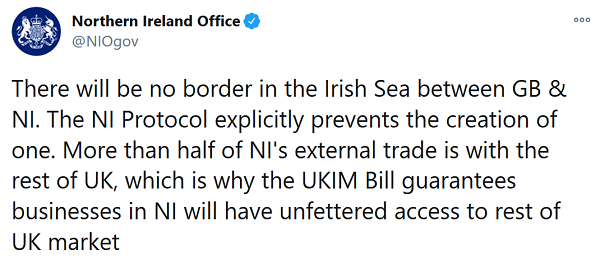
According to the Protocol, and as Northern Irish ports have been preparing for, there will be an increase in checks and controls on goods arriving in Northern Ireland from Great Britain. The UK Government Trader Support Service is intended to support those moving goods between Great Britain and Northern Ireland. Guidance has also been issued on supplying medicines to Northern Ireland, as well as sourcing medicines from Northern Ireland for Great Britain.
The Internal Market Bill
The Internal Market Bill is currently at Committee Stage in the House of Lords. The Lords are expected to vote on the controversial clauses on the Protocol on Ireland/Northern Ireland at Committee Stage rather than Report Stage.
According to the European Commission, the UK has not yet responded to its letter of notice triggering legal action over the Internal Market Bill. The deadline was 2 November. The Commission is considering next steps including a reasoned opinion.
Professor Katy Hayward of Queen’s University has written about how the Internal Market Bill relates to Northern Ireland, including the amendments which have been made.
The Protocol
On 2 November, Secretary of State for Northern Ireland Brandon Lewis laid a draft Regulation which will, if approved, introduce in law the consent mechanism set out in the Ireland/Northern Ireland Protocol. If a First Minister and Deputy First Minister are not in office at the time, an alternative procedure would enable any MLA to bring forward the consent motion. The consent mechanism allows MLAs to vote on the continuation of Articles 5 to 10 of the Protocol every four or eight years, depending on whether cross-community support is given. The first vote is due in late 2024.
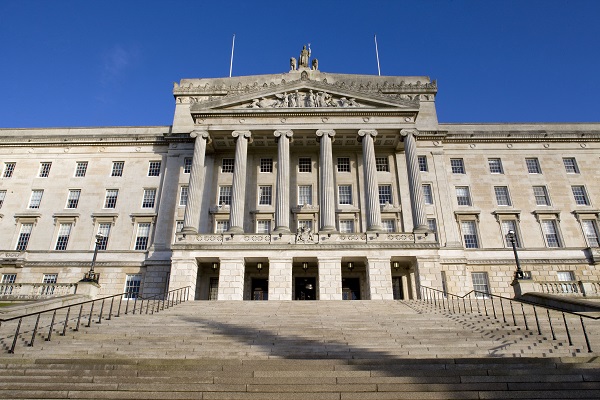
Source: NI Assembly
Joint Ministerial Committee
The Joint Ministerial Committee (EU Negotiations), made up of Ministers from the UK Government and devolved nations, met on 29 October. First Minister Arlene Foster and Deputy First Minister Michelle O’Neill attended, along with the Junior Ministers Gordon Lyons and Declan Kearney. The Committee discussed the ongoing negotiations with the EU, the application of the Protocol, readiness for the end of the transition period, and the UK Internal Market Bill.
Report on Citizens’ Rights
The House of Commons Select Committee on the Future Relationship with the EU published a cross-party report which, urges the UK and EU to protect citizens' rights as per the Withdrawal Agreement, including UK and EU citizens’ right to live and work in the country where they reside.
Catch up with the Committees
21st October – Committee for Infrastructure – Consideration of Secondary Legislation relating to EU Exit
21st October – Committee for the Economy - Departmental Consultation – NI energy legislation relating to EU Exit
21st October – Committee for The Executive Office – Briefing from Departmental Officials on Brexit issues
22nd October – Committee for Health – Consideration of Secondary Legislation relating to EU Exit
22 October – Committee for Agriculture, Environment and Rural Affairs - Departmental officials on The Greenhouse Gas Common Framework – UK Emissions Trading Scheme Order 2020 and a number of subordinate legislation and regulations
22nd October – Committee for Justice - Consideration of Secondary Legislation relating to EU Exit
Brexit at the Assembly this week
3rd November, 4.30pm - Plenary - Motion: The draft Greenhouse Gas Emission Trading Scheme Order
4th November, 10am - Committee for Infrastructure - EU Exit Secondary Legislation
4th November, 2pm - Committee for the Executive Office - Councils and City Council members and officials give evidence on Brexit
4th November, 2pm - Committee for Finance - Written Evidence - PEACE PLUS Programme – Update on development
4th November, 12.15pm - Committee for the Economy - Departmental Written Briefing - EU Exit Legislation
5th November, 10.50am - Committee for Health - Food Standards Agency - UK Common Framework; Secondary Legislation relating to EU Exit
5th November, 10.10 am - Committee for Agriculture, Environment and Rural Affairs - Oral Briefing from DAERA – EU Exit Preparedness; Statutory Instrument
You can watch all committee sessions live on the Assembly's TV site



